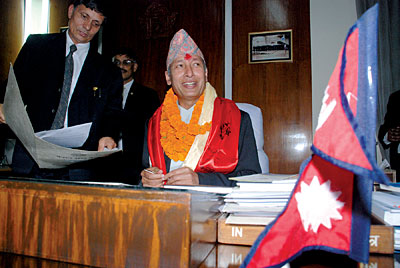 SUNIL PRADHAN |
Finally, there's been agreement on the governor. Well might we wonder why this took so long when Yubaraj Khatiwada was the most likely candidate right from the start.
During the Panchayat regime, everything in government bore the stamp of politics and unfortunately, the hot seat of the governor of the central bank has also been dragged through controversy in the republic. Perhaps the politicians wanted a share of what they imagined the governor would make from every currency bill he signed? One cannot rule out anything in Nepal, given that we are led by a prime minister who went on record to talk of exporting electricity through satellites.
The appointment of Khatiwada comes at a crucial time. The economy is in terrible shape, and no one has been able to figure out why there is so much money in the system but little in the banks and the formal sectors. How come people are now borrowing at five per cent from loan sharks and cooperatives are still doing brisk business? Prices are spiralling and our negative balance of payments indicates we are importing far more than what we are exporting. How is the central bank thinking of dealing with this?
We need government to spend the money that has been allocated � not on junkets and personal expenses, but on development work.
Export sops are the only way to boost exports and please, we are not talking about the export of vegetable ghee or aggregate or sand, we are talking about real products that can take advantage of the 300 million market just south of the border.
We need a clear commitment to the exchange rate with the Indian currency, not whiskey-fueled debates on whether to keep it fixed or floating. Much hard currency, including Indian rupees, is being hoarded by those who are waiting and are expecting the rate to change. Try announcing Indian Rupee parity at 150 and see how much money will flow in!
The central bank's monitoring capacity has to be strengthened. If some banks have to go, let them go, there's no point protecting players that are industry killers. No more licenses please, unless the proposed banks have a specific segment to tap or are able to improve the banking network. It would be far better to allow existing banks to consolidate and merge. How about a one-year window for mergers, for a base capital of Rs 5 or even 10 billion? Tax sops could facilitate these mergers, be it on the notional capital gains for taxes or the taxing of separation costs in the hands of the employees.
On the lending side, have more pragmatic rules on lending against real estate or investments like shares. Bank financing is always the multiplier that increases an entrepreneur's net worth, so not allowing them to leverage loans is like telling an academic researcher you cannot borrow books from a library. But quality rather than quantity should determine such lending. It's not about who you are lending to, it's about what you lend against. This paradigm shift is essential in the banking industry. There is no difference between a kurta-clad money lender and a pinstriped banker if lending is just about providing up to a quarter of what the collateral is worth at crazy interest rates.
Finally, research needs focus. We need to have timely central bank statistics that are disseminated to the market, including research agencies that can interpret them for interested parties.



